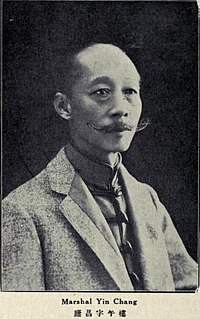Yinchang
Yinchang was recalled to China in 1884 and initially assigned to the Tianjin Naval Academy; however in December he was summoned to Beijing to serve as translator for the German military envoy to the Emperor.
After the First Sino-Japanese War, Germany entered the negotiations of the Treaty of Shimonoseki, and used the assassination of two German missionaries to claim the Kiautschou Bay Leased Territory in Shandong Province.
Yinchang turned Prince Heinrich's mission into a diplomatic rather than military success, by making him the first foreign potentate to be received by the Imperial Court.
[12] It is said that during the Boxer Rebellion, when the troops of the Eight-Nation Alliance stormed Beijing to relieve the besieged Legations, Yinchang, with his German-equipped soldiers, escorted the Emperor Guangxu and the Empress Dowager Cixi to safe passage through the back gates of the Forbidden City into the safety of Shaanxi Province, where the foreigners could not reach them.
[14] In 1901 Yinchang was named Lieutenant-General of the Plain White Banner Garrison (正白旗漢軍副都統)[1][2][10] That August 1901 he was appointed the Chinese Ambassador to Germany (Berlin).
[15] Additionally, in September 1901, by Imperial Edict,[16] Yinchang was charged with accompanying Prince Chun to Germany with the special mission to convey China's regret to Kaiser Wilhelm II for the murder of Baron Clemens von Ketteler during the Boxer Rebellion.
The mission proved an unexpected success, with Prince Chun, the first member of the Imperial family to venture outside China, eagerly awaited by curious, enthusiastic crowds.
[20] The international press covered his every step and his popularity created some anxiety in the Empress Dowager causing her to curtail the rest of his European tour.
[21][22] As ambassador Yinchang was a polyglot, brought up speaking Manchu and Chinese (Mandarin), and in addition to his mastery of German, he knew French, the diplomatic language, and English.
[26] Since Yinchang had cut his hair, he attached a wig braid to his official hat worn during his frequent summons at court, much to the disapproval of the old bureaucrats.
On his arrival in Berlin with his wife and entourage, Yinchang, in General's dress, with monocle and sword, was met by the press as a social notable and ladies’ man.
[1][31][32] Reluctant to leave his work in Germany, Yinchang remarked, “I do not think that our country is yet sufficiently far advanced for a man to be able to achieve great results in a short space of time.
Yinchang's efforts at reform encountered opposition from traditionalists, officials protecting their interests and sinecures, and provincial governments guarding their power.
On the outbreak of the Xinhai Revolution in August of that year, General Yinchang was appointed Commander-in-Chief of the Imperial forces and sent to quell the revolutionary army in Hubei.
[34] However, as soon as he reached the front, his command of the army of the Qing dynasty was countermanded by Prime Minister Yuan Shikai (Chinese vs Manchu), thus leaving vital weapons and ammunition factories unprotected.
[38] With the establishment of the Republic of China, on March 10, 1912, when Yuan Shikai became the interim President in Beijing, the Beiyang government appointed Yinchang as High Diplomatic Advisor in the Ministry of Foreign Affairs.
[9] The following January 13, 1915, the first members of the Senate were sworn in at Guanyue Temple by Yinchang who officiated the oath of office ceremony on behalf of President Yuan Shikai.
[44] In 1922 on the 21st of October, Yinchang, representing the Republic, attended Emperor Puyi's wedding to Princess Wanrong of Gobulo House of the Plain White Banner Clan.
Yinchang was commissioned to publicly convey the official congratulations of the Republic to the Emperor and present him with the special gift of President Li Yuanhong.



